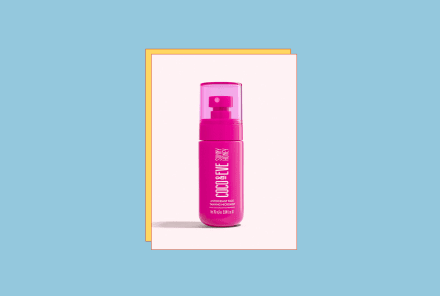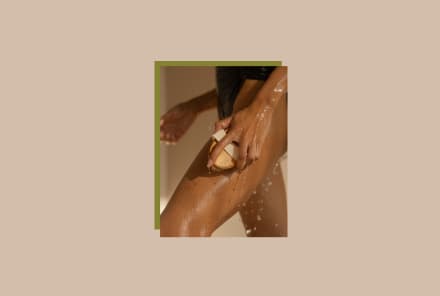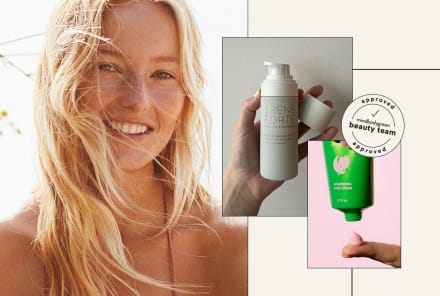Advertisement
Bar Soap Versus Body Wash: How Should You Really Lather Up? Pros, Cons & Final Verdict

When it comes to body care, finding the right cleanser is crucial. After all, the skin is our body's largest organ, and our cleansers cover so much surface area. Bar soap has had a historically bad rap, but now that there are gentle formulas on the market, many people say they're comparable to a moisturizing body wash. So how should we really lather up? Here, we get to the bottom of the bar soap versus body wash debate, so you can streamline your shower.
Body wash pros:
Moisturizes the skin
First up: Body washes are typically formulated to be more gentle and hydrating for the skin. That's because many formulas contain emollients, which can fill in the micro-cracks in our skin and make it appear fuller and smoother. "Emollients help soften and clean without stripping the skin's hydrating oils," board-certified dermatologist Zenovia Gabriel, M.D., FAAD, notes. (Our favorite emollient of the moment has to be ceramides, which lock in moisture and help protect our skin from damage.)
Unlike the squeaky-clean feeling you might get from a bar soap, body washes can replenish your skin's protective barrier, says Gabriel, leaving it soft and hydrated. Just be sure the body wash you're using is free of sulfates as well: "If you have sensitive skin, eczema, or a history of any skin disease, please be sure that any body wash you use is sulfate- and artificial-fragrance-free," board-certified dermatologist Loretta Ciraldo, M.D., FAAD, adds. Sulfates give your body wash that familiar, soapy lather, but it can strip the skin of natural oils, leaving it a little parched (especially if it's already prone to dryness).
More hygienic (sort of).
"Body washes tend to be naturally more hygienic since you are squeezing or pumping out the product," says Gabriel. The cleanser isn't stagnant in a moist soap dish, which can mitigate the risk of bacterial growth.
But there's a catch: If you use loofahs or washcloths to get a foamy lather, you'll want to keep those scrubbers on your radar. Just because the formula itself won't breed bacteria doesn't mean you're totally in the clear. Make sure you're washing your loofahs and washcloths before each use, switching them out every few weeks. Like bar soaps, these tools have the potential to grow bacteria if left in a moist environment.
Body wash cons:
Can include iffy ingredients.
As with all cleansers, checking your labels is key. Liquid body wash contains water, which means it requires a preservative in order to keep the formula bacteria-free (as we know by now, water is a breeding ground for bacterial growth). That's where body washes become a little tricky: You'll want to make sure your wash doesn't contain harsh chemicals like parabens or formaldehyde-releasing preservatives.
Can use virgin plastic.
Perhaps the most obvious con of using body wash versus body soap is the sustainability factor. Body soap tends to come in paper packaging and is recyclable. But, some body washes come in virgin plastic which isn’t the best choice for the environment. If you are leaning toward body wash, try to find one that comes in recycled packaging.
Bar soap pros:
Minimal, purer ingredients.
When formulated by clean and natural manufacturers, bar soap usually just contains the active ingredients you need; because the formula doesn't include water, there's no need for any chemical preservatives to stop bacteria from breeding. What you're left with is just a high concentration of pure ingredients.
Cost-effective and eco-friendly.
With bar soaps, you tend to get more bang from your buck. Some bars cost as little as $1 and can last for several weeks, whereas body washes tend to get used up more quickly. And buying less product doesn't just make your wallet happy; it means less packaging, energy, and resources in the supply chain.
Liquid body wash also contains water—considering 5 billion people will be affected by water shortage by 2025, it's certainly something to consider. On the other hand, bar soaps have a waterless formula, which can support that environmental preservation. With bar soap, you'll perhaps save water, save product, and save the planet—a trifecta of sustainable triumphs from the shower alone.
Bar soap cons:
Breeds bacteria, unless you store it right.
Here's the thing: Bar soap itself isn't unhygienic; rather, it's how you store the bar that matters (and what seems to give bar soaps their bad rap). If they stay moist (like, say, in a puddled soap dish), that's when the bacteria has a field day. If you use bar soap, you'll want to store it in a completely dry area and make sure you wash it before each use: "This reduces the amount of bacteria transferred back onto your body," explains Gabriel.
Can dehydrate the skin.
Ever used a traditional bar soap and stepped out of the shower feeling squeaky clean? It's probably because your bar soap contains sodium lauryl sulfate, a harsh surfactant that can strip your body's natural oils. That's why your skin may feel tight post-shower, as those bar soaps can dehydrate the skin.
"Bar soaps' pH levels are between 9 and 10, while our slightly acidic pH skin level is between 4 and 5," Gabriel explains. When you use those bar soaps, you can cause an increase in your skin's pH levels, which can change the skin's texture1 (and if you already have dry or sensitive skin, those bar soaps can be extra dehydrating).
Of course, there are natural, conditioning bar soap brands that don't use harsh surfactants—it's important to seek those out if you go the bar soap route (our favorites, here). Your skin will thank you!
What is better for you?
For dry or sensitive skin:
For example, if you have dry, rough, flaky, or sensitive skin, you'll want to make sure your cleanser is super, super gentle—a hydrating body wash may be better than a bar soap just because of its emollient properties. Gabriel agrees: "Body washes typically offer mild cleansing that will not strip the natural oils necessary for skin health," she explains.
If your skin is extremely dry, Gabriel even says you can skip cleanser entirely and just rinse with water. Of course, you'll want to use body wash on sweatier places (like the underarm and groin area), but she says using soap only two to three times a week on the skin's surface can avoid drying it further and causing inflammation. If you can't possibly imagine skipping a lather, we get it—just make sure you're using the gentlest cleanser you can find.
For someone looking for actives:
If you’re looking to make some significant changes to your skin, or you prefer to upkeep your body skin as you do your face, you may want to look for some body washes with stronger active ingredients.
These could include antioxidants to fight off free radicals that lead to skin aging, peptides to support skin elasticity, or acids for chemical exfoliation. But of course, if you have sensitive skin you may want to be wary of using body washes with too concentrated of actives.
For someone looking for a no-fuss:
If you’re looking to keep it simple and to the point, we love Dr. Bronner's Pure Castille Liquid Soap. This product not only comes in eight different natural scents but also gets the job done without any harsh chemicals. Natural hydrating ingredients like jojoba and hemp seed oil prevent that stripped, dry feeling that harsh soaps can cause post-rinse.
The liquid soap is easier to store and can be used for more than just washing the body—laundry, gentle household chores, and more. But nevertheless, if you are partial to bar soap, they have that as well.
The verdict.
In terms of the bar soap versus body wash debate, there is no clear winner here. Both cleansers can have questionable ingredients and good-for-you formulas; that said, it's way more about the product's makeup than its physical form. And in case you were wondering, there isn't one that's better at cleaning your body: "Both work well to give you an effective cleanse," says Gabriel. As always, keep your skin type front of mind—if you have sensitive, dry skin, opt for extra-hydrating cleansers (which you may find more easily in body wash form). If you have normal to oily skin and are prone to sweat, you don't have to be as much of a stickler for moisture; an exfoliating bar soap may be just what you need.
The takeaway.
At the end of the day personal preference trumps all. That being said there are certain things to keep in mind when you’re selecting your go-to wash such as skin type, skin goals, price point, and sustainability factors. If you want a quick answer: look for something with clean ingredients in a scent you love, or no scent at all if you’re sensitive to fragrance. One of the most important things to remember is to hydrate your skin with a high-quality moisturizer after you step out to lock in hydration—here’s a list of our favorites.
Watch Next
Enjoy some of our favorite clips from classes
Enjoy some of our favorite clips from classes
What Is Meditation?
Mindfulness/Spirituality | Light Watkins
Box Breathing
Mindfulness/Spirituality | Gwen Dittmar
What Breathwork Can Address
Mindfulness/Spirituality | Gwen Dittmar
The 8 Limbs of Yoga - What is Asana?
Yoga | Caley Alyssa
Two Standing Postures to Open Up Tight Hips
Yoga | Caley Alyssa
How Plants Can Optimize Athletic Performance
Nutrition | Rich Roll
What to Eat Before a Workout
Nutrition | Rich Roll
How Ayurveda Helps Us Navigate Modern Life
Nutrition | Sahara Rose
Messages About Love & Relationships
Love & Relationships | Esther Perel
Love Languages
Love & Relationships | Esther Perel

















